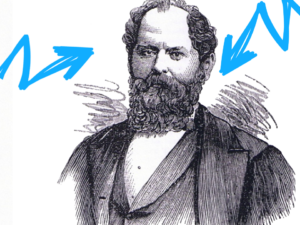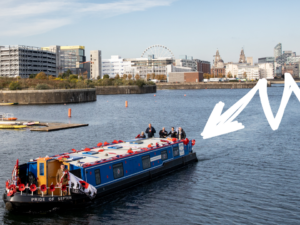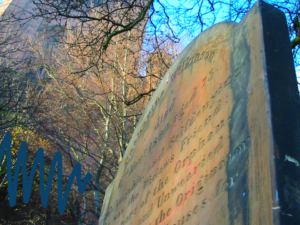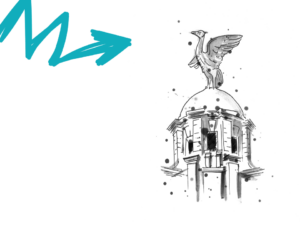
Life has a funny way of weaving patterns you don’t realise its making.
When Festival trustee Eamonn Lavin, landlord at The Philharmonic Dining Rooms, suggested a tour relating to Robert Cian might not be a bad idea, little did he know the network of connections he would trigger. From Eamonn to Emma (Artistic Director and CEO) the news did flow. To Northern Irish theatre friend of 20+ years, who -it transpired- had worked at Dr Duncan’s (a Cains pub) and who trained under John Maguire (the Festival’s History Research group lead) and Greg Quiery (a Festival friend and regular advisor) in learning how to write tours. To Cains Brewery themselves and buildings associated with Robert Cain, crossing back in to work we were already doing on him for the Liverpool Irish Famine Trail. And such are the stories of the Irish in Liverpool. We leave long shadows…
The Story of Cain
When Robert Cain first arrived in Liverpool he strode straight off the boat, into the first pub he saw and picked a fight with the bartender over the quality of the ale on offer. There were also allusions as to the bartender’s parentage and the fidelity of his wife. None of this ingratiated Cain to the regulars and as sure as thunder follows lightning, violence followed Cains tirade.
None of what I just said is true, but sure you never let the truth get in the way of a good story. That’s what I’ve learnt working as a tour guide over the last five years. As an actor, having a gig like being a tour guide comes in very handy when the roles are thin on the ground. I’m first and foremost though, a storyteller.
Apocryphal lives
Robert Cain -and the stories surrounding him- has more than a touch of the apocryphal about him. Where does story begin and truth end? Cain did indeed come to Liverpool as an immigrant, a Cork county native; but he came as an infant with his family of three siblings and parents. He grew up in poverty in the Islington area of Liverpool and was indentured as a cooper (that’s a barrel maker to you and me).
The jump from barrel-maker to barrel-filler isn’t a huge one; soon enough he became a brewer – a noble profession if there ever was one. How he went from a maker of fine beers to owner of the most ornate pubs in Britain is a matter for some debate and intrigue.
The tour
The tour I’ll be running will be an exploration of Cain’s life, times and works. I’ll explore how he went from beer maker to philanthropist in a few short years. We’ll be swinging by some of his mightiest works, the Grade I listed pub The Philharmonic Dining Rooms, for sure, and a few more besides.
But why Robert Cain, and why now? Why is he the subject of a walking tour for the 2022 Liverpool Irish Festival, I hear you say? One word: hunger.
Hunger
So much of the Irish experience can be encapsulated in this one word. Hunger for a better life; a better position in society or just a better future for your children. Hunger to escape the life you’ve found yourself in, through no fault of your own, but by accident of birth. A hunger for justice, perhaps, for the wrongs against one’s people to be righted. Indeed, the period known as the Irish Famine is a sure example of hunger and injustice, given the fact that there was plenty of food to go around, just none of it was in Irish bellies.
Robert Cain represents a success story for the Irish immigrant. He represents someone who made good after suffering through a life of poverty; who came into his own just as a flood of Irish refugees came to Liverpool during the Famine. Cain was in his early twenties when he started brewing in Lime Kiln Lane (near Scotland Road) and it would have been around this time that Liverpool would have seen a huge influx of Irish folks fleeing the situation in Ireland. Did he act as an example for the newly arrived? Did he give them preferential treatment? He was certainly a philanthropist in his later years, but did his charitable works start in this time? I hope delve into these questions, and others, during our tour.
Poor to peer
Perhaps, some would see it as a betrayal that he rose to be quite prominent within the establishment that caused so much chaos for the land of his birth. Two of his sons came to be part of the gentry; one becoming a Baron, the other taking a seat in the House of Lords. When Cain passed away he was one of the richest men in the land. Not too bad for a kid from Cork.
Should we measure success in purely monetary terms? Or should his legacy be measured by the number of lives he has touched, or the number of folk who know a Cain legend or two? Either way, we’ll delve into this on the tour and hopefully discover a truth or two and hear a decent story along the way.



